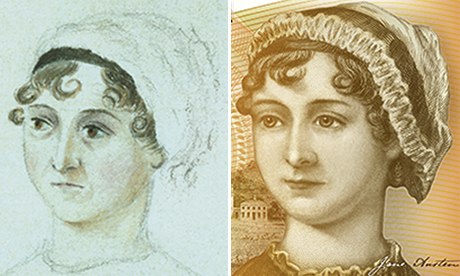
An unsmiling portrait of Jane Austen by her sister, Cassandra, and the image to be used on the new £10 note. Photograph: Bridgeman Art Library
A biographer of Jane Austen has accused the Bank of England of making the author look "dim-witted" in its choice of portrait for the new £10 note.
"Jane Austen is the funniest writer to walk this planet, and she's been made to look dim-witted," said Paula Byrne author of The Real Jane Austen.
"I can't believe they have gone for such a saccharine picture. Jane Austen was a supreme social satirist, and some of her writing was quite dark, but they've chosen a picture that makes her look a really cosy, middle-class writer."
The Bank unveiled the new bank note in July, and its decision to portray Austen was welcomed by campaigners who had protested against the decision to remove Elizabeth Fry from the £5 note, meaning there were no women represented on UK banknotes.
Byrne said: "I think it is brilliant that she's on the note, it's just that it would have been better to show her as much more spiky, rather than suggest that she was a saccharine writer."
She said the Bank should have used an original sketch of the author, by her sister Cassandra. This is the only known picture done during her lifetime, and shows the author sitting arms folded and without a flicker of a smile.
The portrait used on the £10 was done in 1870, more than 50 years after Austen's death, and is based on the earlier sketch. It was commissioned to illustrate a memoir by Austen's nephew, James Edward Austen Leigh, but Byrne said even Austen's remaining family said it was not a proper likeness.
She said the Bank had made a mistake selecting this later image. "They've made her look like a doll, with big eyes. She wasn't smiling in the original and she is in this. It is a Victorian airbrushing of her," said Byrne.
Since the note was unveiled, there have also been objections to the quotation chosen for it, with critics pointing out that the Bank did not seem to have read the book it came from. The line, from Pride and Prejudice, states: "I declare after all there is no enjoyment like reading!", but it said by one of Austen's most deceitful characters in a bid to snare the hero, Mr Darcy.
No comments:
Post a Comment